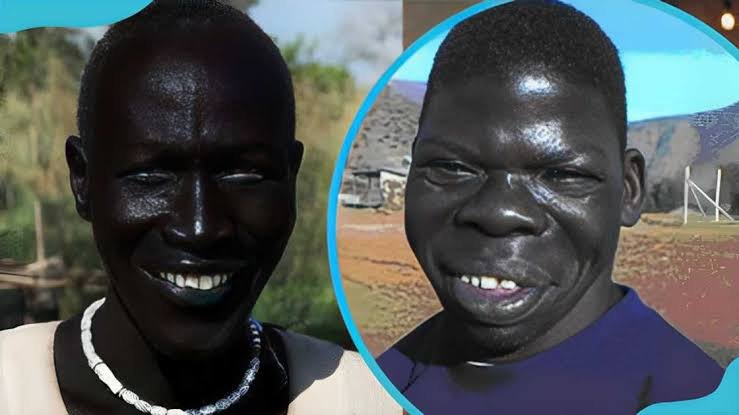When discussing the rich diversity of human skin tones, the term “blackest person in the world” often surfaces in conversations. This phrase refers to individuals whose skin contains the highest levels of melanin, resulting in a deep, dark, and striking complexion. But there’s more to this topic than just physical appearance—it’s about celebrating heritage, embracing individuality, and appreciating the beauty in diversity.
In this blog post, we’ll uncover the story behind the blackest person in the world, delve into the science of skin pigmentation, and shine a light on why this conversation matters.
Who is Considered the Blackest Person in the World?
The title of the “blackest person in the world” is often attributed to individuals with exceptionally dark skin tones due to their genetic makeup and environment. One notable figure frequently associated with this distinction is Nyakim Gatwech, a South Sudanese model celebrated for her radiant ebony skin. Nicknamed the “Queen of the Dark,” Nyakim has used her platform to challenge beauty standards and encourage self-love.
Her skin tone is not just admired for its uniqueness but also symbolizes a deeper story of resilience, pride, and embracing one’s roots. Nyakim’s confidence in her skin has inspired millions, making her an icon in the conversation about beauty and representation.
The Science Behind Skin Pigmentation
Skin color is determined by melanin, a pigment produced by cells called melanocytes. Melanin comes in two main types:
- Eumelanin: Responsible for darker tones.
- Pheomelanin: Associated with lighter skin tones.
The levels of melanin in a person’s skin depend on genetics and evolutionary adaptation to environmental factors like sunlight. People from regions near the equator, such as Africa, have higher melanin levels to protect their skin from intense UV radiation.
Individuals like Nyakim Gatwech exhibit an abundance of eumelanin, giving them their breathtakingly dark complexion.
Why Celebrate Dark Skin Tones?
1. Representation in Media
For too long, mainstream media has idealized lighter skin tones while overlooking the beauty of darker complexions. Icons like Nyakim Gatwech are breaking barriers by redefining beauty standards and proving that beauty exists in all shades.
2. Combating Colorism
Colorism, or prejudice based on skin tone, disproportionately affects people with darker skin. Highlighting and celebrating deep skin tones helps challenge these biases, promoting equality and inclusivity.
3. Cultural Significance
Dark skin carries rich cultural and historical significance. For many, it represents a connection to ancestral roots and a legacy of strength and resilience.
Famous Figures Celebrating Dark Skin
Nyakim isn’t alone in embracing her stunning complexion. Here are a few other individuals who have gained attention for their unique beauty:
- Alek Wek: A South Sudanese-British supermodel who has paved the way for diversity in fashion.
- Khoudia Diop: Known as the “Melanin Goddess,” this Senegalese model is celebrated for her deep skin tone and striking features.
How to Embrace and Celebrate Your Skin Tone
1. Practice Self-Love
Embracing your natural skin tone starts with loving yourself just the way you are. Celebrate what makes you unique!
2. Use Social Media Positively
Follow accounts and influencers who uplift and inspire people of all skin tones. Platforms like Instagram have become powerful tools for representation.
3. Educate Others
Spread awareness about colorism and the importance of embracing diversity. Conversations are a great way to challenge societal norms.
Conclusion: Beauty in Every Shade
The concept of the “blackest person in the world” is more than a superlative—it’s a celebration of diversity, resilience, and individuality. Whether through Nyakim Gatwech’s advocacy, the science of melanin, or the stories of cultural pride, one thing is clear: beauty transcends all shades.
By appreciating and celebrating the spectrum of human skin tones, we take a step closer to a more inclusive world.
FAQs
1. Who is Nyakim Gatwech?
Nyakim Gatwech is a South Sudanese model known for her deeply pigmented skin. She is an advocate for self-love and diversity in beauty standards.
2. What is melanin?
Melanin is a natural pigment responsible for skin, hair, and eye color. It also protects the skin from UV radiation.
3. Is dark skin rare?
Dark skin is not rare but varies in shades across different populations. Extremely dark skin tones, like Nyakim’s, are less common and often celebrated for their uniqueness.
4. Why is dark skin important?
Dark skin plays a vital role in protecting against UV damage. Culturally, it represents heritage, identity, and resilience.
5. How can I combat colorism?
Educate yourself and others, celebrate all skin tones, and support movements promoting diversity and equality.

